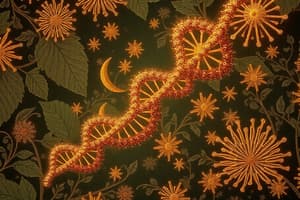Podcast
Questions and Answers
What is the primary purpose of making observations in biology?
What is the primary purpose of making observations in biology?
- To develop new technologies for observation
- To reveal valuable information about natural phenomena (correct)
- To form hypotheses that can be proven true immediately
- To validate previous scientific theories without experimentation
What type of data is typically expressed as numerical measurements?
What type of data is typically expressed as numerical measurements?
- Qualitative data
- Descriptive data
- Quantitative data (correct)
- Hypothetical data
Which of the following statements about a hypothesis is correct?
Which of the following statements about a hypothesis is correct?
- A hypothesis leads to testable predictions based on observations. (correct)
- A hypothesis does not need further testing once formed.
- A hypothesis must be an absolute truth before experimentation.
- A hypothesis can only be derived from theoretical concepts.
Inductive reasoning in scientific inquiry is used to:
Inductive reasoning in scientific inquiry is used to:
What is a crucial step in forming a hypothesis?
What is a crucial step in forming a hypothesis?
What is a key characteristic of a hypothesis in scientific inquiry?
What is a key characteristic of a hypothesis in scientific inquiry?
In the context of hypotheses, which statement is true about the relationship between hypotheses and theories?
In the context of hypotheses, which statement is true about the relationship between hypotheses and theories?
What role do experimental variables play in an experiment?
What role do experimental variables play in an experiment?
Why is the peer review process important in scientific research?
Why is the peer review process important in scientific research?
How do scientists typically approach research questions?
How do scientists typically approach research questions?
Flashcards are hidden until you start studying
Study Notes
Science and Inquiry
- "Science" derives from Latin, meaning "to know."
- Inquiry involves searching for information and explanations for natural phenomena.
- Scientific inquiry encompasses making observations, forming hypotheses, and conducting tests.
Exploration and Observation
- Biology begins with careful observations that provide insights into the natural world.
- Biologists build on previous scientific contributions, facilitated by indexed electronic databases.
Data Gathering and Analysis
- Observations recorded as data can be qualitative (descriptions) or quantitative (numerical measurements).
- Inductive reasoning allows for generalizations based on numerous specific observations, crucial for understanding nature.
Hypotheses
- A hypothesis is a testable explanation derived from observations and assumptions.
- It must lead to predictions that are verifiable via further observations or experiments.
Deductive Reasoning
- Deductive reasoning involves making specific predictions from general premises.
- Testing a hypothesis in various ways enhances confidence in its validity.
Science Limits
- Hypotheses must be testable; untestable claims, such as supernatural explanations, fall outside scientific inquiry.
- Subjective beliefs and religious views are generally not addressed by scientific methods.
Flexibility in the Scientific Process
- The scientific method is not rigid; adjustments may be necessary based on ongoing observations.
- Not all inquiries start with clear questions, as ambiguity can necessitate further studies.
Case Study: Coat Coloration in Mice
- Different color patterns observed in Peromyscus polionotus mice correlate with their respective environments.
- Research by Hopi Hoekstra tested the camouflage hypothesis, predicting predators would target mismatched mice more.
- Models simulating mice coloration were created and tested in various habitats to gather predation data.
Experimental Controls and Variables
- Controlled experiments compare experimental and control groups to assess the effects of independent and dependent variables.
Theories in Science
- Scientific theories are broader and better supported by evidence than hypotheses, leading to further testable hypotheses.
Cooperative Approach in Science
- Scientific research typically involves teams and collaboration among various levels of scientists.
- Communication through seminars and publications is essential; peer review ensures the reliability of research findings.
Building on Previous Research
- Reproducibility and collaboration are key in verifying scientific claims; other scientists may test similar hypotheses.
- Model organisms, like Drosophila melanogaster, facilitate data sharing and collaborative research.
Science, Technology, and Society
- Science aims to explain natural phenomena; technology applies scientific knowledge for practical purposes.
- The interplay between science and technology can significantly impact society, as seen with DNA discoveries.
- Ethical debates surrounding technology focus on implications rather than feasibility, intertwining with politics and cultural values.
Studying That Suits You
Use AI to generate personalized quizzes and flashcards to suit your learning preferences.




